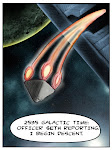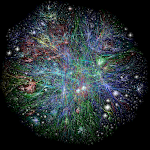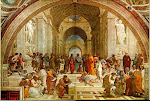Key words: Gulliver’s Travels, Jonathan Swift, Houyhnhnms, racism, colonialism, Plato.

He [his Houyhnhnm master] made me observe, “that among the Houyhnhnms, the white, the sorrel, and the iron-gray, were not so exactly shaped as the bay, the dapple-gray, and the black; nor born with equal talents of mind, or a capacity to improve them; and therefore continued always in the condition of servants, without ever aspiring to match out of their own race, which in that country would be reckoned monstrous and unnatural.”
The Houyhnhnm social structure is thus fixed, with no place for social mobility. Each individual’s role in society is given by the intellectual talents with which he or she is born. However, these talents are determined by coat colour, by race. In the country of the Houyhnhms, each race is given a particular role.
Christine Rees [1] points at the similitude between this colour determination and the one present in Plato's Republic, “with its graded gold, silver, iron and brass for the different classes.” Rees acknowledges, however, that even Plato’s society gives place for certain social mobility. In The Republic, “a golden parent may have a silver son, or a silver parent a golden son, and then there must be a change of rank; the son of the rich must descend, and the child of the artisan rise, in the social scale.[2]”
Gulliver’s perfect society, on the contrary, is racist and inflexible. And even so, it is presented as an ideal opposed to English (and western) society. Our question then would be: Could Swift be intending to apply this metaphor to humanity as a whole?
The answer to this question will depend on how we understand a yet unresolved problem. Some scholars (the so-called soft school) consider Swift is mocking at Gulliver’s admiration for the Houyhnhnms, while not really adhering to the character’s abhorrence of humankind. Others, however, (the hard school) feel Swift is really ‘meaning’ what he writes [3]. Whether we perceive Gulliver as Swift’s alter-ego or as an ironic persona will determine our interpretation of the Houyhnhnms’ rational social structure.
In any case, it’s worth remembering that the understanding of race in Swift’s time was different from the modern biological explanation. Race was in fact a historical and cultural factor. An example of this could be the English relationship with the Irish at the time, which bore most of the characteristics and racial connotations that would apply to European colonialism beyond Europe’s frontiers [4]: the Irish were considered inferior by the English –and even Swift couldn’t do away with this inherited perception (he was an Irishman, he wrote in favour of Irish freedom, but at the same time seemed to acknowledge English cultural superiority).
 Also important is the fact that even when some people realized that all races were equally human and had all the same origin, the notion of hierarchy was something that most thinkers didn’t seem to question. Most people in the seventeenth and eighteenth century took hierarchy and racial domination for granted [5]. Leaving aside Swift’s interpretation then, there’s no doubt that his Houyhnhnms comply with that way of thinking: in their balanced society, a fixed hierarchy based on racial determination is necessary to keep order and peace.
Also important is the fact that even when some people realized that all races were equally human and had all the same origin, the notion of hierarchy was something that most thinkers didn’t seem to question. Most people in the seventeenth and eighteenth century took hierarchy and racial domination for granted [5]. Leaving aside Swift’s interpretation then, there’s no doubt that his Houyhnhnms comply with that way of thinking: in their balanced society, a fixed hierarchy based on racial determination is necessary to keep order and peace. [3] Stock, R. D. (2003) “God, Gulliver, and Genocide: Barbarism and the European Imagination, 1492-
[4] Mahony, Robert (2002) “Swift, Postcolonialism, and Irish Studies: The
[5] Thomson, Ann (2003) Issues at stake in eighteenth-century racial classification. On line: Cromohs.
















.gif)







3 comments:
Unfortunately all of us discriminate someone else and all of us may feel discriminated.we understand discrimination as a negative value, however, we behave according to the belief that there are superior people;such as white,fair haired people in opposition to those who show darker skins.Midgets are discriminated,but so are giants. Homosexuals,lesbians,Muslim people, Jews,African-American,aborigines,etc.All of them are segregated, (in many cases ,white people )all of them are not"perfect" for te Western culture.overweight people, ederly belong to the marginal communities.
There was a theory that conceived a criminal for his/her phisical aspect,that is the so called Lombrosiano point of view (Cesar Lombroso,Italian,1836-1909 )
Susana
I think the notion that Swift advocated a rigid hierarchy of race or class for human society can be dispelled with reference to what Gulliver says elsewhere in Book Four about the hereditary European aristocracy:
"[The] productions of [noble] marriages are generally scrofulous, rickety, and deformed children; by which means the family seldom continues above three generations, unless the wife takes care to provide a healthy father, among her neighbours or domestics, in order to improve and continue the breed. . . [A] weak diseased body, a meager countenance, and sallow complexion, are the true marks of noble blood; and a healthy robust appearance, is so disgraceful in a man of quality, that the world concludes his real father to have been a groom, or a coachman."
Matt, I think your quotation is omitting some important lines. In my opinion, the excerpt you quote can only be understood in its full implication if we take into account the lines prior to it. We learn then, that Gulliver relates these “scrofulous, rickety, or deformed children” to the fact that noblemen “consume their vigour, and contract odious diseases among lewd females,” finally marrying women “of mean birth” and “unsound constitution.”
In this context, it looks to me that Gulliver is not relating the decay of nobility to a genetic weakness produced by inbreeding, but to a genetic infirmity somehow resulting from the moral weakness of the parents. Thus, the problem for Gulliver –at least in this case- would not be the rigid hierarchy of race or class, but the moral constitution of nobility, something which Swift himself overtly scorned.
Post a Comment